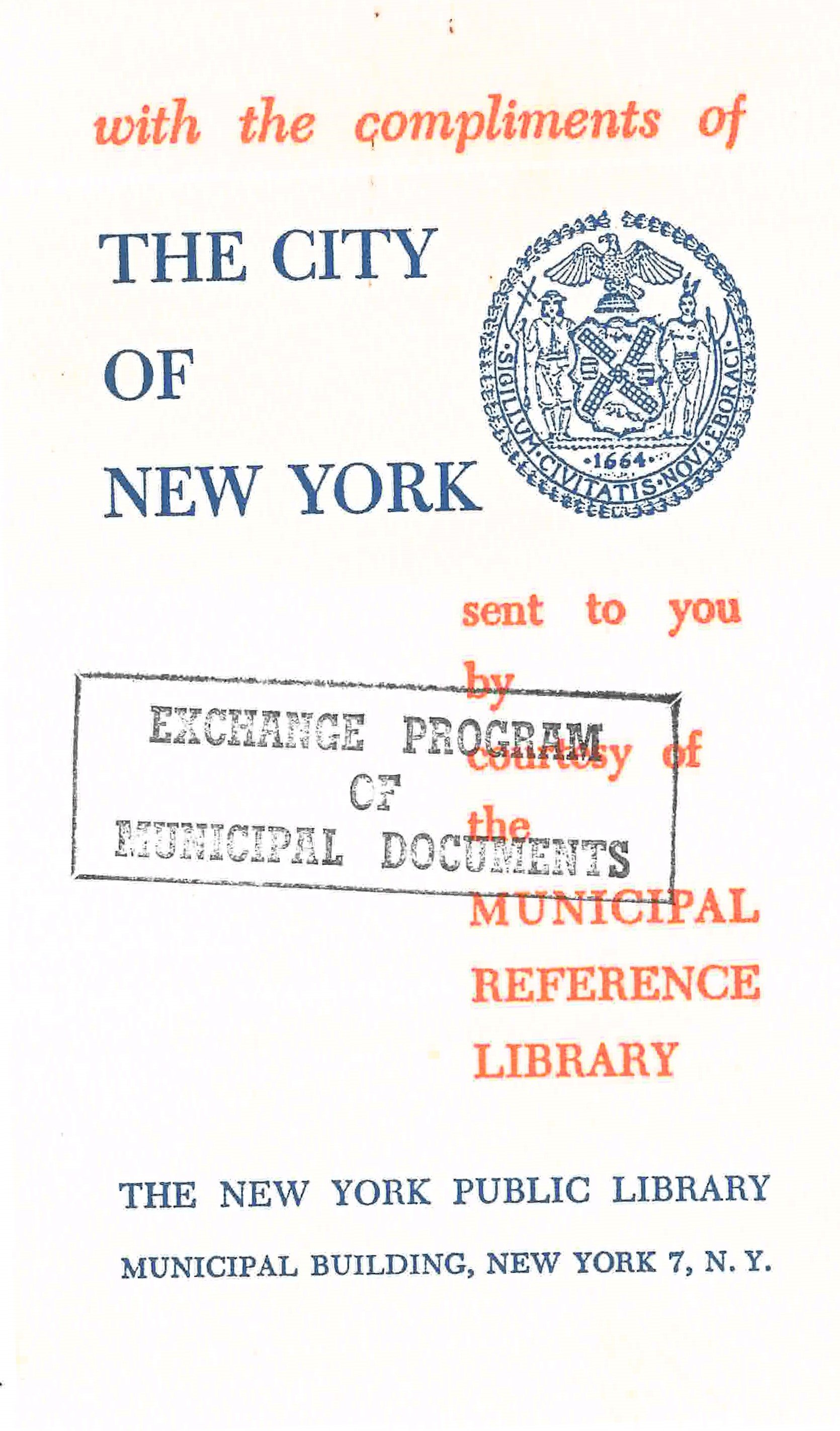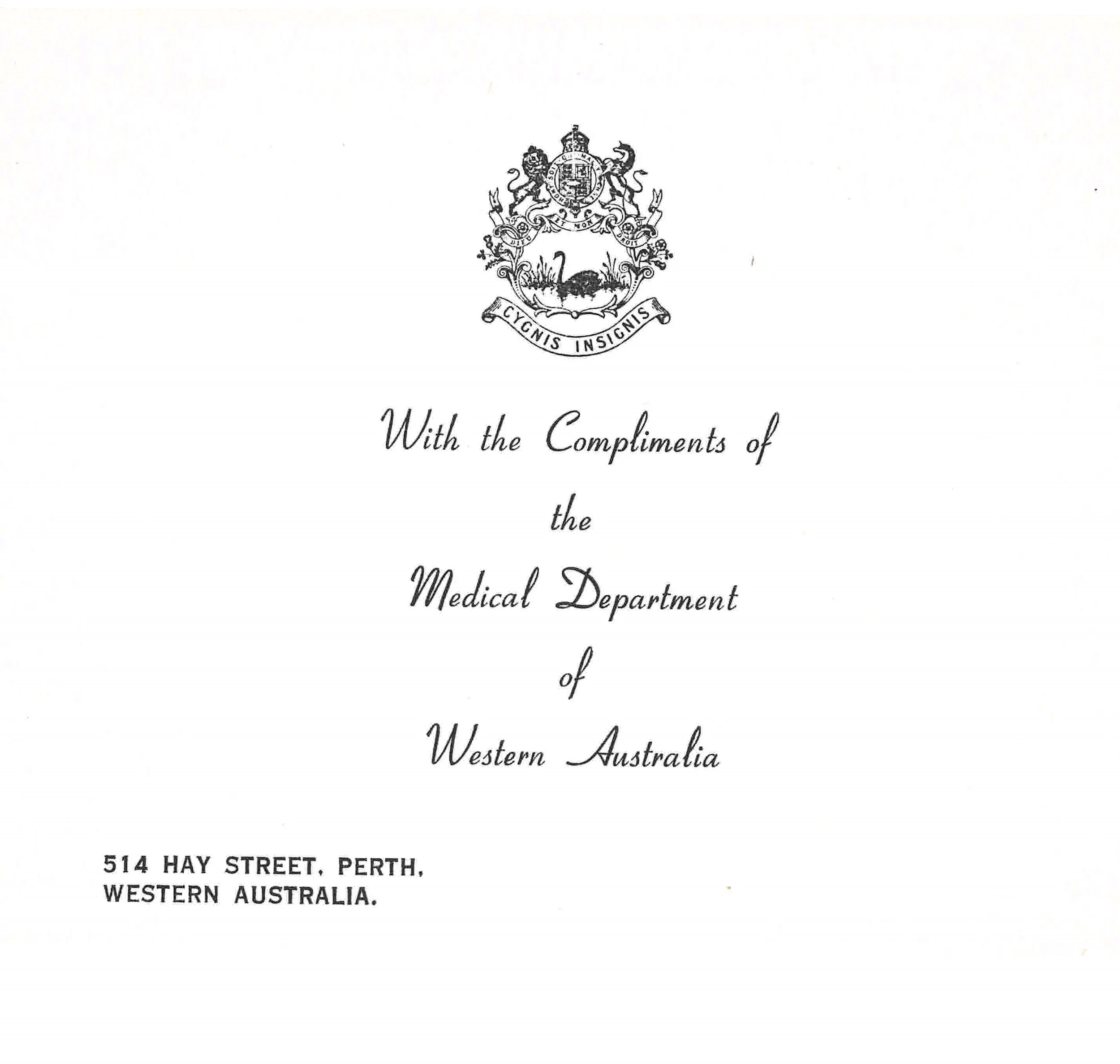These days, people use Google to find almost anything online. But, before there were search engines or personal computers, people relied on hard copy books and records. A recent scrapbook documenting an information exchange that began in 1960 illustrates how local governments shared information.
Municipal Document Exchange Program, “Calling Card,” Municipal Reference Library, 1961. NYC Municipal Library.
The New York City Municipal Library opened in 1913, with a goal of providing up-to-date information about policy developments to City officials in order to reform government. This was during the Progressive Era where the notion of using data and comparative studies to guide decision-making emerged as a field. Specialty libraries with similar goals such as the Department of Health Library were also formed at that time.
In 1961, Municipal Librarian Eugene Bockman took up the effort to exchange information with other cities. Bockman served as the head of the City’s Municipal Library from1958 to 1977, following in the footsteps of the remarkable Rebecca Rankin who presided over the collections from 1920 to 1952.
Monmouth County, New Jersey, Municipal Government Information Center, pamphlet, 1976. NYC Municipal Library.
The initiative resulted from a June 1960 meeting of the Special Libraries Association where the members recommended an exchange of reports, studies and statistics. What better institution to take this on than the City’s Municipal Library.
Municipal Document Exchange Program, “Calling Card,” Chicago Public Library, 1961. NYC Municipal Library.
Initially, fifteen cities participated in the exchange: Baltimore, Chicago, Cincinnati, Cleveland, Detroit, Honolulu, Los Angeles, Milwaukee, New York City, Philadelphia, Sacramento, St. Louis, San Diego, Seattle and Toledo. It was a one-year experiment to “provide civic groups and public officials with a comprehensive collection of local governmental documents and information.” Some of the participating institutions just joined up. Others, such as Milwaukee’s Municipal Library, required legislative authorization from their Common Council.
The resolution passed by that body noted that the State of Wisconsin already participated in a similar exchange and stated that the program would allow the library “to add quickly …those items for which it would otherwise have to spend much time in discovering, ordering, and in follow-up correspondence.” Further, the resolution instructed every city department to print 25 additional copies of reports to be circulated in the exchange.
Municipal Document Exchange Program, “Calling Card,” Reference Library of Cincinnati, 1961. NYC Municipal Library.
By 1961, the participants had expanded to 42, according to the Cincinnati Progress which reported that the exchange offered many advantages including: saving of time as much ordering is eliminated; saving of money as postage and priced documents are included; and prompt receipt of reports and complete coverage are ensured. This means economy in operation and more complete service.”
Each exchanged report came with a little “calling card” stating the item was sent with the compliments of the relevant city. Some are plain; some more elaborate.
Municipal Document Exchange Program, “Calling Card,” City of Adelaide, Australia, 1961. NYC Municipal Library.
Municipal Document Exchange Program, “Calling Card,” Auckland, Australia, 1961. NYC Municipal Library.
Municipal Document Exchange Program, “Calling Card,” Perth, Western Australia, 1961. NYC Municipal Library.
Eventually, the program expanded further afield and included Australian cities as cards from Adelaide, Auckland and Perth attest.
The effort continued, at least through 1976, as evidenced by newsletters and calling cards submitted. Much content in the July, 1976 newsletter forwarded by the Miami-Dade County Library could have been written today. These newsletters typically summarized newly issued publications to update patrons on available content. The newsletter listed two articles on solar energy, prefacing the information with, “In Florida we know that solar energy isn’t really new…”
Municipal Document Exchange Program, “Calling Card,” Honolulu Municipal Reference Library, 1961. NYC Municipal Library.
Municipal Document Exchange Program, “Calling Card,” Municipal Information Library, Minneapolis Public Library and Information Center, 1961. NYC Municipal Library.
Municipal Document Exchange Program, “Calling Card,” Municipal Information Library, Minneapolis Public Library and Information Center, 1961. NYC Municipal Library.
Ironically, now that institutions including the Municipal Library post many collections online and the library catalog on WorldCat, the librarians undertook a sweeping review of holdings in 0000. They then offered municipal libraries around the country many of the documents received via the exchange. Many accepted the offer, having lost track of these publications in the intervening decades.









